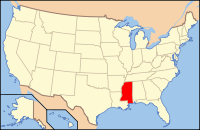Lafayette County, Mississippi
| Lafayette County, Mississippi | |
|---|---|

Lafayette County courthouse in Oxford
|
|
 Location in the U.S. state of Mississippi |
|
 Mississippi's location in the U.S. |
|
| Founded | 1836 |
| Named for | Marquis de Lafayette |
| Seat | Oxford |
| Largest city | Oxford |
| Area | |
| • Total | 679 sq mi (1,759 km2) |
| • Land | 632 sq mi (1,637 km2) |
| • Water | 47 sq mi (122 km2), 7.0% |
| Population (est.) | |
| • (2014) | 52,930 |
| • Density | 62/sq mi (24/km²) |
| Congressional district | 1st |
| Time zone | Central: UTC-6/-5 |
| Website | lafayettems |
Lafayette County is a county in the U.S. state of Mississippi. As of the 2010 census, the population was 47,351. Its county seat is Oxford. The local pronunciation of the name is "la-FAY-et". The county's name honors Marquis de Lafayette, a French military hero and American general who fought during the American Revolutionary War.
The Oxford, MS Micropolitan Statistical Area includes all of Lafayette County.
Lafayette County is often regarded as the inspiration for Yoknapatawpha County, the fictional setting of many of William Faulkner's stories.
According to the U.S. Census Bureau, the county has a total area of 679 square miles (1,760 km2), of which 632 square miles (1,640 km2) is land and 47 square miles (120 km2) (7.0%) is water.
As of the census of 2000, there were 38,744 people, 14,373 households, and 8,321 families residing in the county. The population density was 61 people per square mile (24/km²). There were 16,587 housing units at an average density of 26 per square mile (10/km²). The racial makeup of the county was 71.85% White, 25.05% Black or African American, 0.16% Native American, 1.67% Asian, 0.01% Pacific Islander, 0.42% from other races, and 0.84% from two or more races. 1.10% of the population were Hispanic or Latino of any race.
...
Wikipedia
